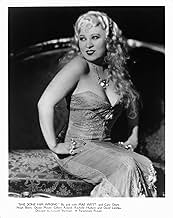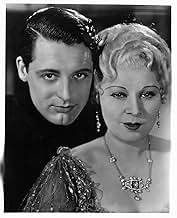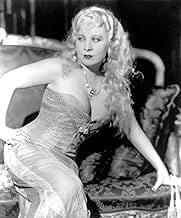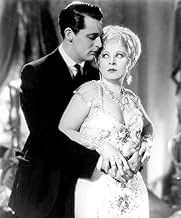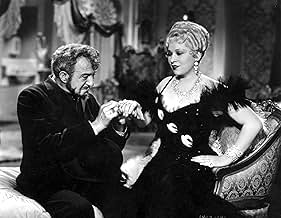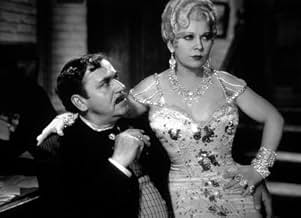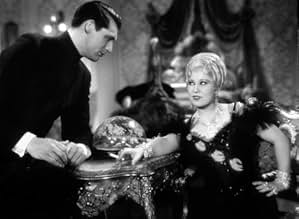IMDb-BEWERTUNG
6,3/10
7444
IHRE BEWERTUNG
Füge eine Handlung in deiner Sprache hinzuIn the Gay Nineties, a seductive nightclub singer contends with several suitors, including a jealous escaped convict and a handsome temperance league member.In the Gay Nineties, a seductive nightclub singer contends with several suitors, including a jealous escaped convict and a handsome temperance league member.In the Gay Nineties, a seductive nightclub singer contends with several suitors, including a jealous escaped convict and a handsome temperance league member.
- Regie
- Drehbuch
- Hauptbesetzung
- Für 1 Oscar nominiert
- 5 Gewinne & 1 Nominierung insgesamt
Noah Beery
- Gus Jordan
- (as Noah Beery Sr.)
Robert Homans
- Doheney
- (as Robert E. Homans)
Ernie Adams
- Man in Audience
- (Nicht genannt)
Billy Bletcher
- Singing Waiter
- (Nicht genannt)
Wade Boteler
- Dan's Pal
- (Nicht genannt)
Jack Carr
- Patron Who Hits His Girl
- (Nicht genannt)
Empfohlene Bewertungen
After a supporting role in the George Raft film Night After Night, Paramount films realized what a gold mine they had in Mae West. Between her and a young radio singer named Bing Crosby, they pulled Paramount from the brink of bankruptcy, the white mountain studio nearly went under in the early Thirties.
After this the studio gave Mae her head in choosing material and she decided to use one of her own original plays, She Done Him Wrong. The story is set in the Bowery district of the 1890s and New York of the 1890s is where Mae grew up, she had a good ear and a good memory for character types she uses in the film.
Mae always plays Mae West and would you really want her as anyone else? She's a Bowery entertainer of the period, working in this case for Noah Beery's club as the main attraction. Beery's into some really shady business, he doubles in white slavery and nearly gets innocent Rochelle Hudson who tries to kill herself in his club. Mae saves her, but turns her over to Beery because she doesn't know about his other sideline. All she knows is that he pays off in diamonds as well as cash.
Besides Beery panting after her, we've got silent screen star Owen Moore, young Gilbert Roland who is the assistant to white slaver Rafaela Ottiana and in the film that would be his breakthrough, Cary Grant as a Salvation Army worker who's not all he seems. Mae personally picked Grant for his role, he was a young Paramount contract player beginning to get some notice. But as I said before in my review of I'm No Angel, this is not a Cary Grant film, this is a Mae West film.
Mae besides being one of the great sex symbols of the last century had a great memory and eye for detail of the bawdy Bowery of her youth. Good thing she came along before The Code was put in place. Her first films are her best, The Code definitely hampered her style.
And Mae West if she had anything, had style.
After this the studio gave Mae her head in choosing material and she decided to use one of her own original plays, She Done Him Wrong. The story is set in the Bowery district of the 1890s and New York of the 1890s is where Mae grew up, she had a good ear and a good memory for character types she uses in the film.
Mae always plays Mae West and would you really want her as anyone else? She's a Bowery entertainer of the period, working in this case for Noah Beery's club as the main attraction. Beery's into some really shady business, he doubles in white slavery and nearly gets innocent Rochelle Hudson who tries to kill herself in his club. Mae saves her, but turns her over to Beery because she doesn't know about his other sideline. All she knows is that he pays off in diamonds as well as cash.
Besides Beery panting after her, we've got silent screen star Owen Moore, young Gilbert Roland who is the assistant to white slaver Rafaela Ottiana and in the film that would be his breakthrough, Cary Grant as a Salvation Army worker who's not all he seems. Mae personally picked Grant for his role, he was a young Paramount contract player beginning to get some notice. But as I said before in my review of I'm No Angel, this is not a Cary Grant film, this is a Mae West film.
Mae besides being one of the great sex symbols of the last century had a great memory and eye for detail of the bawdy Bowery of her youth. Good thing she came along before The Code was put in place. Her first films are her best, The Code definitely hampered her style.
And Mae West if she had anything, had style.
Set mostly in a bawdy saloon/dance hall in NYC during the 1890s, this film is a showcase for the talents of Mae West. She plays Lady Lou, a self-confident, sassy singer with a quick wit, who entertains customers with songs that have a Blues theme and were popular in vaudeville.
In this role, buxom Mae West is at her best. She struts her stuff, she wears tons of diamonds, she smiles in a slightly mischievous way, she rolls her eyes, and she speaks in a voice that is more than a little nasal. Her costumes are glamorous and flamboyant. In short, she presents an on-screen image that is wonderfully ... unique.
The film's story is thin and largely irrelevant. It involves the people around Lady Lou, some of whom are schemers and cheats. Implicit sexual references in the dialogue, and the character of Lady Lou, led the "National Legion of Decency" to push down our throats the Production Code, a wretched policy device that censored cinematic content for some thirty years thereafter.
If I have a complaint with this film it is that the story is too serious. Mae West is placed in scenes that allow her merely to recite dialogue. She is less an actress than a singer and on-stage performer. I would have preferred a more lighthearted musical theme, to play up her musical talents.
And so for me, the best parts of this film are the musical numbers few though they may be. Mae West sings "Frankie And Johnny" and a couple of other songs. One of my favorite sequences occurs about midway through the film. In what appears to be an authentically designed music hall set, an Irish tenor with a big mustache sings "Silver Threads Among The Gold", a musical tearjerker popular with barbershop quartets of that era. The song's sad theme prompts a man in the audience literally to "cry in his beer". Gas lights point upward to the stage. And behind the singing tenor, a curtain sways back and forth, with product signs that read "Old Whiskey", "Dijon Burgundy", among others. It's a sequence that is straight out of vaudeville. Marvelous!
"She Done Him Wrong" is a film whose story almost gets in the way of the main character, played by a legendary talent. The film is worth watching more than once, but only to see marvelous Mae West, and to listen to those wonderful songs from the bygone days of vaudeville.
In this role, buxom Mae West is at her best. She struts her stuff, she wears tons of diamonds, she smiles in a slightly mischievous way, she rolls her eyes, and she speaks in a voice that is more than a little nasal. Her costumes are glamorous and flamboyant. In short, she presents an on-screen image that is wonderfully ... unique.
The film's story is thin and largely irrelevant. It involves the people around Lady Lou, some of whom are schemers and cheats. Implicit sexual references in the dialogue, and the character of Lady Lou, led the "National Legion of Decency" to push down our throats the Production Code, a wretched policy device that censored cinematic content for some thirty years thereafter.
If I have a complaint with this film it is that the story is too serious. Mae West is placed in scenes that allow her merely to recite dialogue. She is less an actress than a singer and on-stage performer. I would have preferred a more lighthearted musical theme, to play up her musical talents.
And so for me, the best parts of this film are the musical numbers few though they may be. Mae West sings "Frankie And Johnny" and a couple of other songs. One of my favorite sequences occurs about midway through the film. In what appears to be an authentically designed music hall set, an Irish tenor with a big mustache sings "Silver Threads Among The Gold", a musical tearjerker popular with barbershop quartets of that era. The song's sad theme prompts a man in the audience literally to "cry in his beer". Gas lights point upward to the stage. And behind the singing tenor, a curtain sways back and forth, with product signs that read "Old Whiskey", "Dijon Burgundy", among others. It's a sequence that is straight out of vaudeville. Marvelous!
"She Done Him Wrong" is a film whose story almost gets in the way of the main character, played by a legendary talent. The film is worth watching more than once, but only to see marvelous Mae West, and to listen to those wonderful songs from the bygone days of vaudeville.
Mae West had a Broadway smash when she penned the bawdy tale of DIAMOND LIL for herself--and with a few tweaks here and there the story came to the screen as SHE DONE HIM WRONG. The film was an immediate hit and the role of Lady Lou remains one of West's best remembered performances. The script is jam-packed with some of West's most famous lines, including the memorable "Come up'n see me sometime. I'm home every evenin'" and "You can be had." West throws her lines with style, aplomb, enough innuendo to make a censor cringe, and considerable humor--but, somewhat surprisingly, the movie is not really a comedy.
SHE DONE HIM WRONG is a hard-knocks tale of Bowery bruisers who dance attendance upon the 'Lady Lou' and often resort to crime to keep her dripping in the diamonds she prizes above all else. But although she has one lover already locked up in jail, another one mixed up in the white slavery rackets, and still a third waiting to step into the gap, the Lady Lou is more interested in seducing missionary Cary Grant... only to find him less interested in her body than her soul, a circumstance that prompts West to utter one of the most how-did-that-get-past-the-censors lines in 1930s cinema: "Maybe I ain't got no soul." This is a surprisingly tough little movie, and in addition to West's zinging lines and occasional musical numbers SHE DONE HIM WRONG also offers a glimpse at a very young (and still slightly wooden) Cary Grant; it also has an ensemble cast that plays in a very enjoyable grand manner, truly first rate production values all the way, and A surprisingly brisk running time. West did funnier films than this, but the mix of her sharp wit and the rough story is particularly memorable. This is where the fire started really started, and I recommend it very strongly.
Gary F. Taylor, aka GFT, Amazon Reviewer
SHE DONE HIM WRONG is a hard-knocks tale of Bowery bruisers who dance attendance upon the 'Lady Lou' and often resort to crime to keep her dripping in the diamonds she prizes above all else. But although she has one lover already locked up in jail, another one mixed up in the white slavery rackets, and still a third waiting to step into the gap, the Lady Lou is more interested in seducing missionary Cary Grant... only to find him less interested in her body than her soul, a circumstance that prompts West to utter one of the most how-did-that-get-past-the-censors lines in 1930s cinema: "Maybe I ain't got no soul." This is a surprisingly tough little movie, and in addition to West's zinging lines and occasional musical numbers SHE DONE HIM WRONG also offers a glimpse at a very young (and still slightly wooden) Cary Grant; it also has an ensemble cast that plays in a very enjoyable grand manner, truly first rate production values all the way, and A surprisingly brisk running time. West did funnier films than this, but the mix of her sharp wit and the rough story is particularly memorable. This is where the fire started really started, and I recommend it very strongly.
Gary F. Taylor, aka GFT, Amazon Reviewer
Mae West is another one of those actresses that played the same role time after time. She played Mae West. What distinguishes the movies are the lines and she was a masterful created of double entendre with a big load of sex. She would surround herself with the actors of the day, like Gilbert Roland and Wallace Beery. The one that benefited the most here was Cary Grant. It's hard to realize that he goes back so far. I have to admit that for mot of my life I found West's thing to be off handed and tiresome. But now I know that she had great timing and and interesting stage presence. She could deliver a "dirty" line like no other. This gave us the famous like, "Come up and see me sometime."
It appears that some modern day critics have forgotten what a great period film is all about. This very authentic replica of the Gay Nineties (1890s) is accurate right down to the horse hair furniture, gas lamps, Brooklyn accents and costumes. It was adapted from Mae West's Broadway hit "Diamond Lil" and coupled with West's other 1933 hit (I'm No Angel), saved Paramount from bankruptcy. The film was so loved by audiences that midnight showings were needed to accommodate the crowds, and it was so lurid that seven countries banned the film altogether. It was nominated for the best picture of 1933 and was West's favorite of all her twelve films. The film introduced the famed line (although it's uttered slightly different in the movie) "Come up and see me sometime." Some of Mae's funniest work is here, and she sings three great tunes. Edith Head did all the costumes and Lowell Sherman directed. Modern times have dulled the bluntness of this film, but be assured, it was an eye-popper in 1933.
Wusstest du schon
- WissenswertesThe National Legion of Decency was formed in October of 1933, six months after the release of this film. Legion officials cited Mae West and the film as one of the major reasons for the "necessity" of the organization.
- PatzerShadow of camera moves against the back wall of Lady Lou's apartment while she and Sally are talking.
- Alternative VersionenMaryland, Massachusetts, New York, Ohio, and Pennsylvania removed the song "A Guy What Takes His Time". Will H. Hays and Adolph Zukor went to New York to edit the song to an entrance by Mae West, one opening verse, and one closing verse to lessen the suggestiveness. Despite this, Ohio and Pennsylvania cut all of West's one liners.
- VerbindungenFeatured in The Twentieth Century: The Movies Learn to Talk (1959)
Top-Auswahl
Melde dich zum Bewerten an und greife auf die Watchlist für personalisierte Empfehlungen zu.
- How long is She Done Him Wrong?Powered by Alexa
Details
- Erscheinungsdatum
- Herkunftsland
- Sprache
- Auch bekannt als
- Nació para pecar
- Drehorte
- Produktionsfirma
- Weitere beteiligte Unternehmen bei IMDbPro anzeigen
Box Office
- Budget
- 200.000 $ (geschätzt)
- Laufzeit
- 1 Std. 6 Min.(66 min)
- Farbe
- Seitenverhältnis
- 1.37 : 1
Zu dieser Seite beitragen
Bearbeitung vorschlagen oder fehlenden Inhalt hinzufügen


